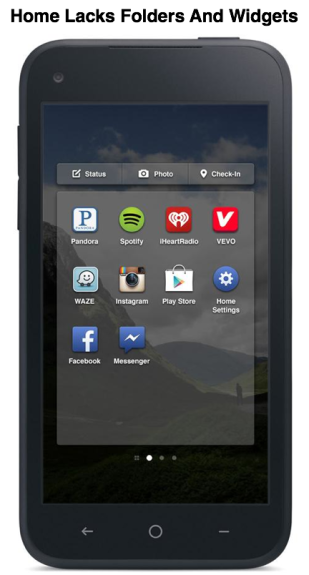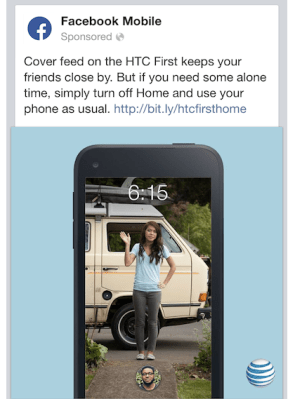Desperate to make its homescreen replacement Home seem less invasive, Facebook is advertising that you can temporarily deactivate it and use your HTC First or other Android phone as normal. The fact that Home replaces your widgets and app folders has been a core complaint. Facebook vows to fix that, but until then it’s reminding people they can leave Home for stock Android or their old launcher.
The post by the Facebook Mobile Page which was also being shown as an ad in some peoples mobile feeds, says “Cover feed on the HTC First keeps your friends close by. But if you need some alone time, simply turn off Home and use your phone as usual. http://bit.ly/htcfirsthome“. When turned off, the HTC First reverts to stock Android 4.1, and the downloadable version of Home gives way to whatever launcher users had installed before.
Facebook COO Sheryl Sandberg addressed the issue of users’ disappointment with how Home takes over their phone this week at D11 when asked if the product was a success:
“Facebook Home is v1 of what we think is a very large transformation that we think will absolutely happen, which is rebuilding your phone around people.
The way [phones are] organized is still around activities and apps. We think that phones will be reorganized around people, and we think Facebook Home is the first version of that. We consider it v1, very early. We’d love if we could put out a v1 version and get everything right. The feedback we’re getting is very bi-modal. If you look at our stars, we get fives and we get ones. We get almost no threes.
The people who love it, they’re heavy Facebook users. They want that experience. Not only do they love it but the metrics are working very well for us. They’re using Facebook 25% more and they’re doing 10% more more messaging. So this is a win, both in terms of how this will drive our business and for them.
For the people who don’t love it, they don’t like how it takes over their phone. They don’t like how the launcher re-organizes the apps they’ve already launched, but for the most part they actually like the two core features we launched which are Cover Feed and Chat Heads. So what we are doing is getting that feedback. I don’t know how long it will take. I think it will be a long road. but we really believe we’re on a path to making phones more social.”
As Sheryl explained, a big issue with Home was the sacrifice you have to make to use it. Android users gain some features, but have to give up much of the personalization they’ve worked to build into their phone in the form of widgets, folders, and app organization. I believe their omission from Home is related to some of the team that built Home being iPhone users who don’t have these options normally, so they didn’t miss them.
 Supporting these customization features could make Home more of a bonus than a trade. When Home launched, Facebook Product Director Adam Moserri told me there were a lot of features he wished had made it into the initial build, including app folders.
Supporting these customization features could make Home more of a bonus than a trade. When Home launched, Facebook Product Director Adam Moserri told me there were a lot of features he wished had made it into the initial build, including app folders.
Now Facebook is trying to get some of that functionality added through its monthly updates to Home. On May 9th at a small press conference at Facebook headquarters, Moserri unveiled Dock, a tray of a user’s favorite apps that’s persistently visible at the bottom of homescreen app launcher. Facebook plans to let users import their Dock of most frequently used apps from their previous Android launcher into Home.
Many are calling Home a flop already, and maybe it will be, but it’s early to make that judgement now. Facebook has a very long-term view for the software. Mark Zuckerberg’s belief is that we’re destined to share more and more with our friends, so some will want to prioritize them ahead of utility applications in their phones.
Zuckerberg told Wired’s Stephan Levy, “Three years from now, people are going to be sharing eight to ten times as much stuff. We’d better be there, because if we’re not, some other service will be.” That’s the goal of Home. But for Facebook to get to that future, it needs Home to gain traction. It’s hasn’t yet, having only hit one million downloads on May 10th. The active user count is suspected to be much smaller. As Sandberg said, it will be a long road to success…if Facebook’s even going in the right direction.
